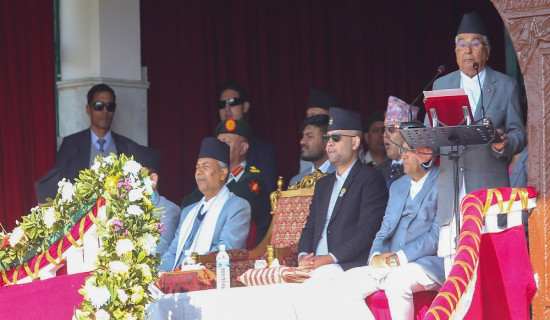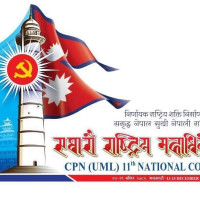- Monday, 15 December 2025
Coordination key to combat money laundering: PM
By A Staff Reporter,Kathmandu, Jan. 28: Prime Minister KP Sharma Oli has underscored the need for coordinated efforts among agencies involved in the anti-money laundering system to effectively curb financial crimes.
In his message on the occasion of the first National Anti-Money Laundering Day, 2025 on Monday, the Prime Minister highlighted the need for collaboration among indicator institutions, regulatory bodies, law enforcement agencies, and judicial entities.
The message was read out at the First Money Laundering Prevention National Day 2081’ in Lalitpur.
“To uphold financial integrity by preventing criminally acquired assets from entering the financial system, the anti-money laundering system must operate effectively,” the PM said in his message.
The Prime Minister expressed his best wishes for enhanced efforts to address the issue and inspire the maintenance of financial integrity in the future.
He also urged individuals engaged in professions, trade, and business with good intentions to work confidently and without hesitation in their professional and business pursuits.
Meanwhile, Deputy Prime Minister and Finance Minister Bishnu Prasad Paudel has stressed the need to work seriously to comply with international agreements and implement the laws and regulations we have made in the field of money laundering prevention.
He made this remark while addressing the ‘First Money Laundering Prevention National Day 2081’ organised here on Monday with the slogan "Transparency in Financial Activities, Commitment to Anti-Money Laundering".
Nepal celebrated National Anti-Money Laundering Day for the first time on Monday after 17 years of promulgation of the Money Laundering Prevention Act 2008.
“The problem of money laundering is a problem not only of Nepal, it is a problem of the entire world. Most countries in the world are making great efforts to overcome this problem and maintain good governance and fiscal soundness. Nepal is also making its efforts in this regard as well,” DPM Paudel said.
He said that the government has formulated necessary laws, regulations, and structures and has taken forward the work of investigation and prosecution. In this context, Nepal has done significant work in preventing money laundering, he said.
Dozens of laws and regulations have been amended and hundreds of organisations have been established and they are working efficiently in the field of money laundering prevention.
“However, the truth is that Nepal has not been able to do as much as it should and could have done in this area. Due to this, Nepal has not been able to make a strong presence in the world in the field of anti-money laundering,” he said.
He said that the problem arose because we did not do enough work in the past.
“We, who passed the first and second evaluations, should have done the third one effectively. But, we failed because we did not do much work. No matter how much we hide, many questions have been raised about us,” Paudel said.
Chief Secretary Eak Narayan Aryal said that although Nepal had made good progress in terms of making commitments and enacting acts and laws, Nepal is weak in implementing commitments and adhering to rules and regulations.
“We have been seen as good at making commitments and enacting laws. But our weakness has been seen in terms of adhering to rules and regulations and reporting on time,” Aryal said, “Now for a year, we must work seriously to implement such rules and regulations and fulfil our commitments, otherwise the nation itself will face a big problem.”
Secretary at the Office of the Prime Minister and Ministers of Councils Phanindra Gautam said that Nepal's progress in the third round of assessment is not satisfactory.
He said that problems include profiteering by keeping property in someone else's name, not transparent real estate transactions and excessive cash transactions.
He said that all stakeholders associated with Money Laundering Prevention System should work with honestly and in coordination to control financial crimes and maintain good governance.
Governor of Nepal Rastra Bank Maha Prasad Adhikari said that Nepal is likely to be listed as a high-risk country in terms of money laundering and go under international monitoring.
He said that the Asia Pacific Group (APG) of the Financial Action Task Force, the body that monitors money laundering, has shown a situation in which Nepal is likely to be under the gray list in terms of money laundering.
He said that the APG would take Nepal to the money laundering blacklist on the basis of not meeting the international standards set by the Financial Action Task Force (FATF) with the aim of preventing money laundering and illegal activities.
He said that the FATF would decide whether to keep Nepal on the grey list after looking at all the reports of Nepal in the assessment to be conducted from February 17 to 21.
Governor Adhikari said that even if Nepal is included in the money laundering grey list, many foundations have been laid to get out soon.
“The regulatory bodies should identify the areas of risk and work to minimise the risk. If the regulatory bodies work in a coordinated manner, Nepal can be out of the gray list soon if it is listed in that,” he said.
He stressed the need to minimise risks, saying that new risks have been emerging with the increasing digital transactions.
He said that strict action should be taken against those who acquire wealth through illegal means.
Director General of Department of Money Laundering Investigation Suman Dahal said that a massive reform has been made in the financial system.
"But we know that reform is an ongoing process. The latest criminal activities, especially digital crimes, that have been seen in recent times are challenging the reform of our system. Reforms are needed that can confront them and move forward," he said.
He said that there is a lack of literacy on the issue of money laundering, which will help in reducing this gap. The Department has also organised a week-long programme on the occasion of Anti-Money Laundering Day.
He said that currently, work is being done with a strategic mindset of minimising the risk of financial crimes for the protection and stability of the economy and financial system.
On the proposal of the Department, a meeting of the Council of Ministers held on December 31, 2024, decided to celebrate 14th Magh every year as the National Money Laundering Day, marking the date of the promulgation of the Money Laundering Prevention Act 2008.
After becoming a member of the APG in 2002, Nepal has performed well in the field of money laundering prevention and the results we have experienced are already evident, he said.
"In the first half of the current fiscal year, the Department has filed 15 cases. This number is almost double the average of previous years. Out of these, cases have been filed with claims worth about Rs. 55 billion. About 30 cases have also been decided in a year," he said.
The success rate of the 117 cases filed by the Department since its establishment is also encouraging. It is around 85 per cent, he said.
After the amendment of the act, more cases have been filed by the Commission for the Investigation of Abuse of Authority, the Department of Revenue Investigation and the Nepal Police.
















